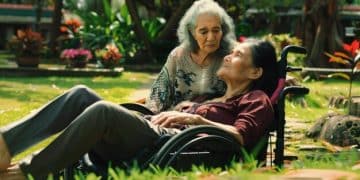National Family Caregiver Support Program: Eligibility & Benefits

The National Family Caregiver Support Program (NFCSP) provides resources and assistance to family caregivers who are caring for older adults or individuals with disabilities, offering support services like respite care, counseling, and education to help ease their caregiving responsibilities.
Navigating the world of caregiving can be overwhelming, but understanding available resources can make a significant difference. This article explores Understanding the National Family Caregiver Support Program: Eligibility and Benefits, a vital program designed to support those who dedicate their lives to caring for others.
What is the National Family Caregiver Support Program?
The National Family Caregiver Support Program (NFCSP) is a federal initiative aimed at providing support to family caregivers. It recognizes the crucial role these individuals play in caring for older adults and people with disabilities, helping them maintain their independence and quality of life.
Established as part of the Older Americans Act (OAA), the NFCSP offers a range of services designed to ease the burden on caregivers and improve their well-being. These services are delivered through a network of state and local agencies, ensuring that support is accessible at the community level.
Key Goals of the NFCSP
The NFCSP aims to achieve several key objectives:
- Providing Information and Assistance: Helping caregivers learn about available resources and services to support their caregiving responsibilities.
- Offering Individual Counseling: Providing caregivers with a safe space to discuss their challenges and develop coping strategies.
- Respite Care: Giving caregivers temporary relief from their duties, allowing them to recharge and attend to their own needs.
- Supplemental Services: Supplying aids and services that complement the care provided by family members.
The NFCSP assists family members, friends, neighbors, and other informal caregivers. This broad definition ensures that various types of caregivers can access needed support.
In conclusion, the NFCSP offers a critical lifeline to caregivers, acknowledging their indispensable role and providing them with the resources and support they need to continue providing quality care.
Who is Eligible for the NFCSP?
Understanding the eligibility criteria for the National Family Caregiver Support Program (NFCSP) is essential for those seeking assistance. The program targets specific groups of caregivers to ensure that resources are directed to those who need them most.
Eligibility for the NFCSP generally falls into two primary categories: caregivers of older adults and caregivers of individuals with disabilities. Each category has its own specific requirements.

Caregivers of Older Adults
To be eligible as a caregiver of an older adult, you must meet the following criteria:
- Age of the Care Recipient: The person receiving care must be 60 years of age or older.
- Relationship to the Care Recipient: The caregiver must be a family member or another informal caregiver, such as a friend or neighbor.
- Caregiving Responsibilities: The caregiver must be providing ongoing care to the older adult, assisting with activities of daily living (ADLs) or instrumental activities of daily living (IADLs).
Caregivers of Individuals with Disabilities
For caregivers of individuals with disabilities, the eligibility requirements are somewhat different:
- Age of the Care Recipient: The person receiving care must be any age with a disability.
- Relationship to the Care Recipient: The caregiver must be the parent, or other family member, who is the primary caregiver.
- Caregiving Responsibilities: The caregiver must provide ongoing care and support to the individual with a disability, helping them with ADLs, IADLs, or other necessary assistance.
In summary, eligibility for the NFCSP hinges on the age and condition of the care recipient, as well as the caregiver’s role and responsibilities. Meeting these criteria is essential for accessing the program’s valuable support services.
What Benefits Does the NFCSP Offer?
The National Family Caregiver Support Program (NFCSP) provides a comprehensive suite of benefits designed to assist caregivers in managing their responsibilities and enhancing their well-being. These benefits are tailored to meet the diverse needs of caregivers, offering both direct support and access to valuable resources.
The NFCSP offers five core service categories, each aimed at addressing specific challenges faced by caregivers.
Information and Assistance
This service helps caregivers access relevant information and resources. It includes:
- Information on Available Services: Providing details on local, state, and national resources that can support caregivers and care recipients.
- Referrals to Community Resources: Connecting caregivers with agencies and organizations that offer specialized assistance, such as home care services, transportation, and legal support.
- Educational Materials: Offering brochures, guides, and other materials to help caregivers better understand their roles and responsibilities.
Counseling and Training
This service offers emotional support and practical skills development:
- Individual Counseling: Providing a safe space for caregivers to discuss their feelings, challenges, and concerns with a trained professional.
- Support Groups: Connecting caregivers with others who share similar experiences, fostering a sense of community and mutual support.
- Caregiver Training Programs: Offering workshops and classes on topics such as stress management, communication skills, and specific caregiving techniques.
Respite Care
Respite care provides temporary relief for caregivers, allowing them to take a break:
- In-Home Respite: Arranging for a trained caregiver to provide care in the home, giving the primary caregiver time to rest or attend to other obligations.
- Adult Day Care: Enrolling the care recipient in a structured program that offers social activities and supervision in a safe environment.
- Short-Term Institutional Care: Providing temporary care in a nursing home or assisted living facility for longer periods of respite.
Supplemental Services
These services provide additional support to complement the care being provided:
- Home Modifications: Assisting with modifications to the home to improve safety and accessibility for the care recipient, such as installing grab bars or ramps.
- Assistive Technology: Providing devices and equipment that can help the care recipient maintain independence and mobility, such as walkers, wheelchairs, and personal emergency response systems.
Access Assistance
Understanding the process for applying and qualifying for needed benefits and services can be overwhelming. An access assistant can help navigate:
- Assistance with applying for necessary Medicaid benefits: Walking through the process, explaining necessary qualifications, and answering important questions.
- Advising on how to get Veteran’s benefits: Helping family caregivers of veterans navigate the requirements and submission process.
In summary, the NFCSP offers a wide array of benefits designed to support caregivers in various ways. From providing information and counseling to offering respite care and supplemental services, the program strives to ease the burden on caregivers and improve their overall well-being.
How to Apply for the National Family Caregiver Support Program
Applying for the National Family Caregiver Support Program (NFCSP) involves several steps, but understanding the process can make it more manageable. Here’s a guide to help you navigate the application:
The application process typically involves contacting your local Area Agency on Aging (AAA) or a similar agency that administers the NFCSP in your area.
Find Your Local Area Agency on Aging (AAA)
The first step is to locate the AAA that serves your community:
- Use the Eldercare Locator: Visit the Eldercare Locator website (eldercare.acl.gov) to find the AAA in your area by entering your zip code.
- Contact Your State Unit on Aging: Reach out to your State Unit on Aging for information on local agencies and resources.
Contact the AAA
Once you’ve identified your local AAA, reach out to them to inquire about the NFCSP application process:
- Phone Call: Call the AAA and speak with a representative to learn about the program and the steps required to apply.
- Visit in Person: If possible, visit the AAA office to discuss your needs and gather application materials.
- Online Inquiry: Some AAAs may have online forms or email addresses for inquiries about the NFCSP.
Assessment
Once you express an interest in the NFCSP, the AAA will typically conduct an assessment to determine your eligibility and needs:
- Eligibility Verification: The AAA will verify that you meet the eligibility criteria for the NFCSP, based on the age and condition of the care recipient and your role as a caregiver.
- Needs Assessment: A caseworker will assess your specific needs and challenges as a caregiver, identifying which services and support would be most beneficial for you and the care recipient.
Application Submission
After the assessment, you’ll need to complete and submit an application for the NFCSP:
- Application Form: Obtain the application form from the AAA, either online or in person.
- Required Documentation: Gather any required documentation, such as proof of age for the care recipient, medical records, or verification of your relationship to the care recipient.
- Submission: Submit the completed application and supporting documents to the AAA according to their instructions.
Approval and Service Enrollment
Once your application is reviewed and approved, you can begin enrolling in the services offered by the NFCSP:
- Service Selection: Work with the AAA to select the services that best meet your needs and the needs of the care recipient, such as respite care, counseling, or supplemental services.
- Service Enrollment: Complete any necessary enrollment paperwork for the selected services and begin receiving support from the NFCSP.

In applying for the NFCSP, make sure to gather all required documentation, providing accurate information. The NFCSP is a vital resource for caregivers, so persistence and thoroughness are key to accessing the support you need.
Tips for Maximizing the Benefits of the NFCSP
To make the most of the National Family Caregiver Support Program (NFCSP), it’s essential to understand how to effectively utilize its resources. Here are some tips to help you maximize the benefits and ensure you receive the support you need.
By following these tips, caregivers can effectively leverage the resources provided by the NFCSP to enhance their caregiving abilities and improve their overall well-being.
Develop a Care Plan
Creating a detailed care plan can help you identify specific needs and access appropriate services:
- Assess Care Recipient’s Needs: Evaluate the care recipient’s physical, emotional, and social needs.
- Set Goals: Establish clear goals for caregiving, such as maintaining independence or improving quality of life.
- Involve Professionals: Consult with healthcare providers, social workers, and other professionals to create a comprehensive care plan.
Communicate Effectively with the AAA
Maintaining open communication with your Area Agency on Aging (AAA) is crucial:
- Regular Updates: Keep the AAA informed of any changes in the care recipient’s condition or your caregiving needs.
- Ask Questions: Don’t hesitate to ask questions about available services, eligibility requirements, or the application process.
- Provide Feedback: Offer feedback on the services you receive to help the AAA improve their programs and better serve caregivers.
Join Support Groups
Participating in support groups can provide emotional support and valuable insights:
- Local Groups: Look for support groups organized by the AAA or other local organizations.
- Online Communities: Join online forums and communities for caregivers to connect with others and share experiences.
- Share and Learn: Share your challenges and learn from the experiences of other caregivers.
Utilize Respite Care
Respite care is essential for preventing caregiver burnout:
- Plan Ahead: Schedule respite care in advance to ensure you have regular breaks from caregiving responsibilities.
- Explore Options: Consider various respite care options, such as in-home care, adult day care, or short-term institutional care.
- Prioritize Self-Care: Use respite time to focus on your own physical and emotional well-being, engaging in activities you enjoy.
Stay Informed
Keep up-to-date with the latest information and resources for caregivers:
- Websites: Regularly check websites of organizations like the National Council on Aging (NCOA) or the Family Caregiver Alliance (FCA).
- Newsletters: Subscribe to newsletters from caregiver organizations to receive updates on new programs, research findings, and policy changes.
In short, it’s important to develop a care program and communicate with the AAA. Joining support groups, maximizing respite care, and above all, staying informed will ensure the most benefit from the NFCSP.
Resources for Caregivers Beyond the NFCSP
While the National Family Caregiver Support Program (NFCSP) offers significant assistance, it’s also important to be aware of other resources available to caregivers. These additional resources can provide further support, information, and services to help you in your caregiving journey.
Exploring these resources can provide caregivers with a more comprehensive support network, ensuring they have access to a wide array of services and information to help them navigate the challenges of caregiving.
Family Caregiver Alliance (FCA)
The FCA is a national nonprofit organization that provides support and resources to family caregivers:
- Online Resources: Access a wide range of articles, fact sheets, and guides on various caregiving topics.
- Caregiver Support Programs: Learn about caregiver support programs, including counseling, education, and respite care.
- Policy and Advocacy: Stay informed about policy issues affecting caregivers and advocate for caregiver-friendly policies.
Area Agencies on Aging (AAA)
AAAs operate at the local level and offer a variety of services for older adults and their caregivers:
- Information and Referral: Connect with local resources and services, such as home care, transportation, and meal programs.
- Caregiver Support: Access caregiver support programs, including counseling, training, and respite care.
| Key Point | Brief Description |
|---|---|
| ℹ️ Program Overview | The NFCSP offers support to family caregivers of older adults and individuals with disabilities. |
| ✅ Eligibility | Caregivers must care for someone over 60 or an adult of any age with a disability. |
| 🤝 Key Benefits | Benefits include respite care, counseling, information, and supplemental services. |
| 🗺️ How to Apply | Apply through your local Area Agency on Aging (AAA) with eligibility verification. |
Frequently Asked Questions (FAQ)
▼
The primary goal is to support family caregivers by providing resources and services that help them care for older adults and individuals with disabilities, to maintain independence and enhance their well-being.
▼
Eligible caregivers are family members or informal caregivers (friends, neighbors) who provide ongoing care for adults aged 60 and over, or parents/family caregivers for any-aged individuals with disabilities.
▼
The NFCSP typically offers services such as respite care (temporary relief), counseling, information and referral services, caregiver training, and supplemental services like home modifications or assistive technology.
▼
You can find your local Area Agency on Aging by visiting the Eldercare Locator website (eldercare.acl.gov) and entering your zip code, or by contacting your State Unit on Aging for local resources.
▼
While the NFCSP provides services, some services may have associated costs or require cost-sharing based on income and resources. Contact your local AAA to inquire about specific costs.
Conclusion
Understanding the National Family Caregiver Support Program: Eligibility and Benefits is crucial for accessing the support needed to provide quality care. By exploring eligibility criteria, available benefits, and the application process, caregivers can effectively utilize this program to enhance their caregiving abilities and improve their overall well-being.





